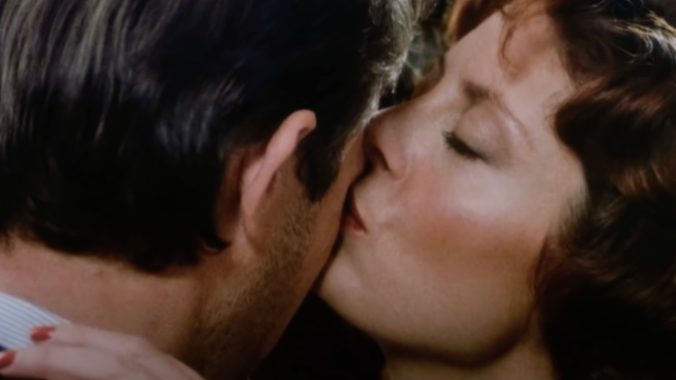35 Years On, America Needs Movies as Horny and Smart as Bull Durham
Screenshot via YouTube
In the second act of Adaptation, the fictionalized Robert McKee (Brian Cox) famously tells the fictionalized Charlie Kaufman (Nicholas Cage) and a room of aspiring scripters that voiceover is a symptom of “flaccid, sloppy writing.” But something vital happens when Annie Savoy’s (Susan Sarandon) intelligent, wandering words open 1988’s Bull Durham. “I believe in the Church of Baseball,” the English teacher tells us in a thick Southern accent, “The only church that truly feeds the soul, day in, day out.” My dad similarly told me during a Fenway game, “This is America’s mosque!” We always understand the characters’ absurd, ridiculous behavior because we know the passion, the love Annie and the Durham Bulls minor leaguers feel for the sport.
Annie has a system all worked out: every Bulls season, she picks out the best player and gives him her own “spring training.” She’ll read Walt Whitman to them, give tips on their throw, and say goodbye when the organization “makes a change” or they switch to the majors. Her pick this year is Ebby Calvin “Nuke” LaLoosh (Tim Robbins), a young, dumb, hilariously overconfident pitcher with “a million dollar arm, but a five cent head.” Enter Crash Davis (Kevin Costner), a veteran player the Bulls have hired to train the slapdash rookie. Crash and Annie work together to help Nuke improve his aim while also dealing with their obvious mutual attraction.
Yes, Bull Durham, now 35 years old, is often cited as the greatest baseball movie. Writer/director Ron Shelton actually played with the Rochester Red Wings for five years, and there’s a ring of authenticity here, especially in the absurd chaos of the umpire fights, the hushed way the characters call the major leagues “the show.” Like a lot of great art, it is also about love and worship—what church, what life have you given yourself to, and how long, how much, will you be able to give in the long run? Annie cites Whitman as well as the radical Christian William Blake, and the script shares those poets’ anti-Puritan, passionate sensibilities. So many American films are, for better or worse, about work, but Bull Durham is all about play: the characters correctly believe art, sex, and games are the true value of living. (“Beats workin’ at Sears,” Bulls manager Skip, played by Trey Wilson, says of the team early on to a reluctant Crash.)
-

-

-

-

-

-

-

-

-

-

-

-

-

-

-

-

-

-

-

-

-

-

-

-

-

-

-

-

-

-

-

-

-

-

-

-

-

-

-

-








































